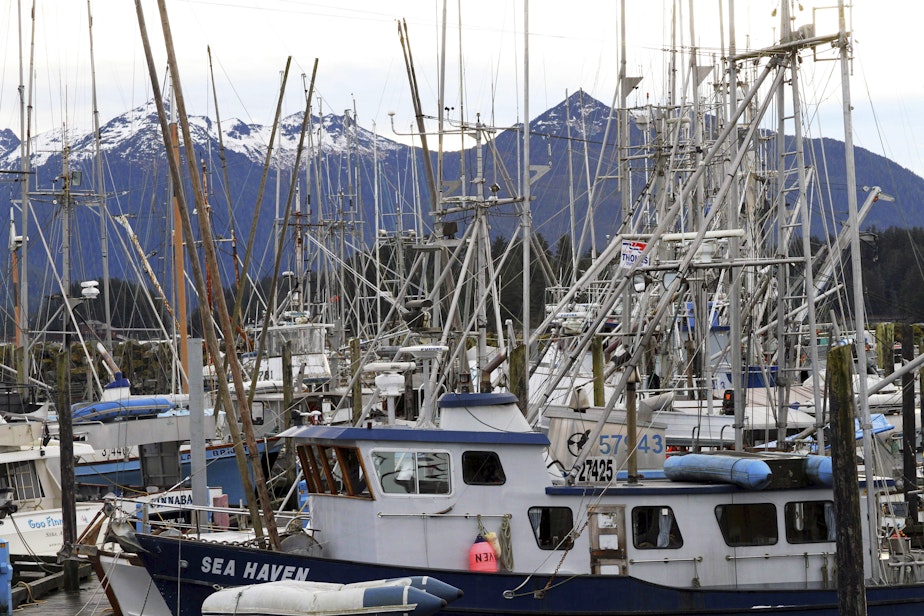'It's simply devastating in ways that many people don't realize' – Alaska cancels crab seasons

On Monday, Alaska officials made an unprecedented announcement.
For the first time ever, they canceled the winter snow crab harvest in the Bering Sea.
They also nixed the fall Bristol Bay red king crab harvest for the second year in a row.
Jamie Goen, executive director of the Alaska Bering Sea Crabbers, says the total cancellation of the season came as a surprise.
"We were hoping for at least a small season," Goen said. "It's been devastating to get this news, and our fishermen are in shock and trying to figure out what's next. 'Cause we're heading in to the second year now of record low levels for our king crab stocks and our snow crab stocks in Alaska."
Alaska Bering Sea Crabbers represents around 350 people and a fleet of 60 vessels. They fish for king, snow and bairdi crabs in Alaska waters, and many of their boats are based in Seattle.
The Alaska Department of Fish and Wildlife says it's trying to balance the needs of long-term conservation efforts, and the sustainability of crab stock.
A few years ago, Snow crab populations suddenly collapsed – likely the result of a warming event in the Bering Sea. Meanwhile the population of mature female red king crabs have been in steep decline since 2008.
Sponsored
Goen says this decision will have a major impact on their fishermen.
"There's gonna be many boats tying up with the dock this year. Our vessels are facing bankruptcy," she said. "They're having to lay off crew and some of these crew had been working on these boats for 10 and 20 years."
Goen noted she's already spoken to fishermen that are planning to sell their homes or boats.
"This is a way of life, fishing," she said. "And there aren't a lot of other fisheries to go into. So, it's going to be a job transition. And so we're trying to scramble and figure that out, how to help them find other work."
And this will have ripple effects in Washington state, where a lot of the Alaska catch is processed and sold.
Sponsored
Hundreds of crab boats also spend the off season in Seattle, where they often get larger shipyard services.
"Our fishermen are expecting a $500 million loss now that we're in the second year of this low harvest or closures," Goen said. "But what that means for the support businesses – the shipyards in Seattle, fuel docks, gear manufacturers, it's looking at a billion dollars in losses. It's simply tremendous."
Fishermen do care about sustainability, notes Goen. Alaska Bering Sea Crabbers had been in talks with The Alaska Department of Fish and Wildlife prior to this announcement.
"We believe that there could have been a small harvest this year on these stocks, because of what the science shows," Goen said.
But Goen says the Department eventually decided to err on the side of caution, completely shutting down the season.
Sponsored
Currently fishermen do not get the same financial relief from the federal government as farmers do.
"So we've been asking Congress to create some program that will give us this urgent relief," Goen said. "There is a fishery disaster program through National Marine Fisheries Service. But it takes two to four years through that program to get money into the hands of fishermen."
They have also asked for the North Pacific Fishery Management Council to take additional conservation efforts for crab stock. The council is the body that makes recommendations on fisheries management and conservation to keep the U.S. seafood stock sustainable.
"Alaska Bering Sea Crabbers has come to the council over the last two years asking for emergency actions to close certain areas from other fishing gears that are impacting crab through their bottom contact," Goen said. "And the council has yet to take any actions to conserve these crab stocks, which is really troubling for our fishermen."
Jon Speltz, the co-owner of Wild Salmon Seafood Market located in Ballard's fisherman terminal, says we could see red king crab stocks as expensive as $50 a pound.
Sponsored
But Speltz says that adapting to changing conditions and prices is part of a fish monger’s job.
"Your whole business strategy is to be able to handle adversity and curveballs that are coming at you every day," Speltz said. "And so this is just another curveball that you just have to deal with."
The Wild Salmon Seafood Market will continue to sell dungeness crab, a popular variety here in the Pacific Northwest, as well as some king crab.
But sometimes, the needs of a sustainable industry may mean higher prices.
"There is a real change in the ocean, and the Puget Sound waters, that has affected how we operate," Speltz said. "Basically, that means higher prices."
Sponsored
For Speltz, his biggest concern is for the fishermen he works with.
"We'll be fine and we'll make it through but, you know, our partners in all of this are fishermen," he said. "And certainly this is going to be hugely devastating for the craft, you know, some of them will be able to make it through and some will be going out of business."
You can hear more from Soundside about the impact of Bristol Bay warming here





